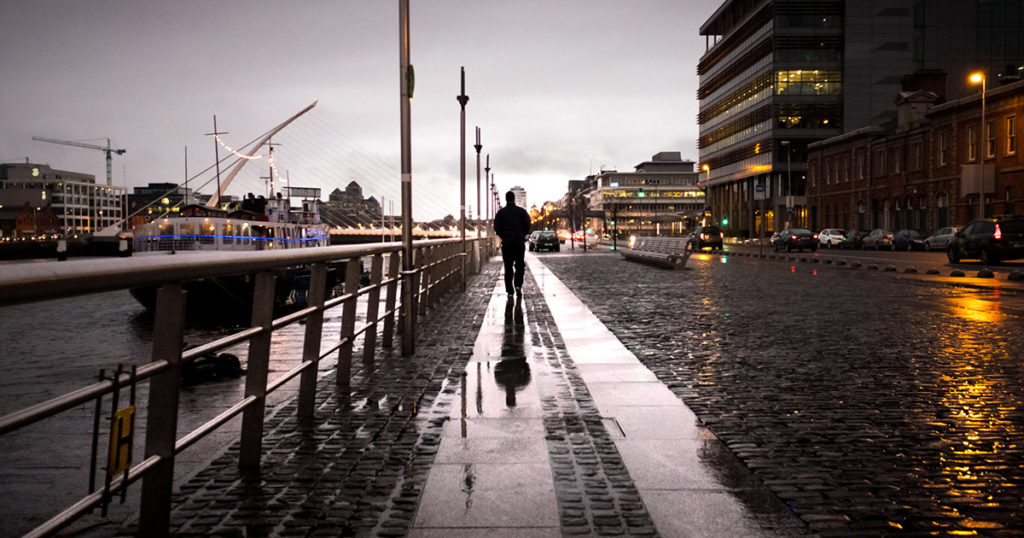
Someone said that all of us Irish writers toil in the shadow of Ulysses. I prefer to think of myself as basking in its radiance, but seeing those words written now, I feel embarrassed by them. The verb bask looks wrong. The whole phrase is glib and trite. It looks rote and unconsidered. I feel this way much of the time while reading Joyce. As much as I love him, he makes me feel that any attempt of mine to wield language is ham-fisted and juvenile. But then, my reading history is littered with books that have done that, and they will surely appear in my reading future. The heap of unread advance-copy novels at my left elbow will contain moments that evince envy and awe and leave me with a momentary sickness borne of the relentless shock of the repeated discovery of my own limitations.
I’ve read Ulysses three times. The first time I read it, my motivation was amorous and pathetic: I wanted to impress my English teacher. I was 15 and in love. In my memory, I told her that I’d read it and she was impressed and she smiled at me as she would at a colleague or a friend as we discussed it in an empty classroom filled with light. But a forensic, coldly objective examination of that memory reveals it to be false. I did the reading but not the telling. And then I created an interesting lie and placed it among my truths. God knows why. I only have the vaguest handle on my adolescent self. He’s a nebulous and strange proposition to me, and so, like Leopold Bloom, all I can do from this remove is speculate about him, wonder what it might have been like to be him.
The second reading came after I was appointed a lecturer in English and creative writing at the University of Limerick. Ulysses was surely going to be a part of my teaching life, and so I thought I’d better have something to say about it that wasn’t drawn from the memory of a teenage boy who was himself only a memory. I’d forgotten nearly everything. How beautiful it was, how funny. How I’d come across a sentence such as, “On his wise shoulders, through a checkerwork of leaves, the sun flung spangles, dancing coins,” and not known the name of the feeling it gave me, only that I felt the same way sometimes when listening to music or looking at a wave breaking, a feeling of the existence of something in the world that could perfectly articulate how glorious it was to be alive and to bear silent witness to beauty, how it can seem sometimes to flood and cleanse the world of all its caprices and cruelties.
I read Ulysses for the third time shortly after I was bereaved by suicide. It was a very real fact to me now that Leopold was not an Everyman. These sound like the words of a desperate narcissist, but I don’t care. Every thought of Leopold’s was mine on this reading. Every corner he turned on his epic perambulation uncovered a truth to me about myself and my own dense burdens of grief, regret, and revelation. Every play on words, every jibing, loving swipe at the world through which he moved, was a thin hand extended from Joyce to me in friendship and sympathy. Leopold, the greatest of all literary empaths, knew my pain, as Joyce knew. I was a teenage boy again, a child, sick and fearful and bursting with feelings for which I had no name.
When I say that I love Ulysses, I mean it sincerely. When I say that Leopold Bloom is not an Everyman, I mean that he’s no mere witness-bearing cipher, or a barre from which Joyce launches his linguistic gymnastics; he is an expression of Joyce’s grief, for himself, for Ireland, for the world, for the fact that all living creatures must suffer and die. Leopold, the timorous, myopic, daydreaming outsider, a Jew among Christians, an introvert among braggarts, an aesthete among boors, collides with his own being, over and over again on his long Dublin day, and deflects his own being again and again, imagining himself changed into anything but himself, anything but the small man he sees himself to be, beset and bullied, pitied, mocked, cuckolded. He is at ease, even happy, only in wonder. Leopold isn’t an Everyman, but Joyce wrote Ulysses for everyone; it is a bawdy, loud, swaggering, hilarious opera about a small, quiet, studious man whose heart is broken.
Joyce knew, and he told us through his monumental love letter to wonder, that we are pressurized from within to bear the weight of the world’s sorrows. He saw in the regulation and imbalance of these opposing pressures, the internal and the ambient, the richest of paradoxes, the divinest of comedies. We give godly status now to a man who saw within himself and in the world around him the ineffable exquisiteness of the human, the temporal, the quotidian. In the rushing of water, the falling of light, the lifting grace of music, the taste of food, the touch of flesh against flesh, is all the saving beauty we could ever need.

